The Department of Physics had two winners in this year’s Maths, Physics and Life Sciences Impact Awards. Dr Elliot Bentine receives the Early Career Researcher Impact Award while Dr Thomas Hird receives the Public Engagement with Research (PER) Impact Award.
Easy diagnosis of cardiovascular disease
Dr Bentine is a Senior Postdoctoral Research Fellow and his work in developing a novel device for diagnosing and monitoring cardiovascular diseases earned him the ECR Impact Award. In recognition of the fact that treatment is cheaper and more effective when made early in the progression of cardiovascular diseases, Dr Bentine collaborated with Dr Winok Lapidaire from the Radcliffe Department of Medicine to develop a new low-cost, portable and easy-to-use device for imaging blood vessels.
Professor Ian Shipsey, Head of Department for Physics said, ‘Elliot’s development of low-cost, high-resolution apparatus for diagnostic imaging of changes in blood vessels is a wonderful example of the application of skills and technology derived from pure physics research to a practical application in medicine.
‘Elliot is harnessing microscopy, optics and laser techniques to address the challenge of diagnosing cardiovascular disease, one of the leading causes of death globally. His development of the idea with Dr Lapidaire, from prototype to the early stages of spin-out and preparation for clinical trial, demonstrates remarkable drive and aptitude for innovation.’
Preparing for quantum
Postdoctoral Research Assistant, Dr Hird, has been recognised for his work in raising awareness of quantum technologies and enabling collaborative research. He consistently contributes to the national Public Engagement with Research (PER) landscape around quantum technologies, and excels at integrating meaningful engagement in many areas of his research, engaging tens of thousands of people. His leadership in bringing the core skills of scientific coding into the Department of Physics’ central PER programme is also helping to change the culture around collaborative engagement.
Professor Ian Shipsey, Head of Department for Physics comments: ‘Tom’s enthusiastic use of cutting-edge quantum technology research to reach out to schools is exemplary. His engagement with schools to create genuine and challenging research projects, through the atom interferometer and computing projects based on open-source data from CERN, is imaginative and particularly well targeted for developing the skills and interest of pupils with potential to study STEM subjects at degree level and beyond.’

